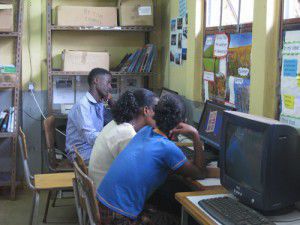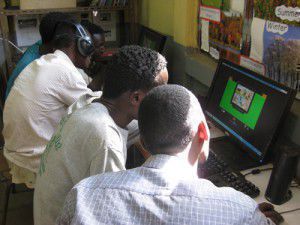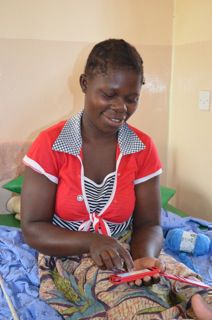Encouraging English learners in Ethiopia
Our guest post today is by Elizabeth Horsefield, a volunteer with the VSO in Ethiopia.
Ethiopia was perhaps not the intended market for a EuroTalk Interactive Learn English CD-ROM. But it’s going down a storm. I work as a VSO volunteer in a Teacher Training College in a rural area of Western Oromia, Ethiopia. We have an English Language Improvement Centre (ELIC) which recently acquired two new desktop computers complete with headphones and speakers. Perfect.
 The students are desperate to improve their English. For most of them this usually involves sitting silently in front of an old copy of some estranged grammar book and making notes. Others even read the Oxford dictionary in the hope that it will one day magically transform their communication skills in English. Many of them went to school in remote areas with very few educational resources. Often their experiences in the ELIC provide a first opportunity to use a keyboard and mouse, so operating an interactive CD-ROM in their second or maybe third language might have been beyond their capacity. It would appear not.
The students are desperate to improve their English. For most of them this usually involves sitting silently in front of an old copy of some estranged grammar book and making notes. Others even read the Oxford dictionary in the hope that it will one day magically transform their communication skills in English. Many of them went to school in remote areas with very few educational resources. Often their experiences in the ELIC provide a first opportunity to use a keyboard and mouse, so operating an interactive CD-ROM in their second or maybe third language might have been beyond their capacity. It would appear not.
 Every afternoon (hours scheduled for computer use outside of their regular classes), the students come and learn. Sitting alone or in pairs, I allow them half hour slots to navigate around the different activities and keep score. The cultural context of the material is apparent. These Ethiopian students are not familiar with eating roast chicken, going sailing or playing the trombone. But this only serves to highlight how culture and language are two halves of the same whole and they are quick to overcome any misunderstandings with the help of the pictures and a little guidance from the native speaker (me).
Every afternoon (hours scheduled for computer use outside of their regular classes), the students come and learn. Sitting alone or in pairs, I allow them half hour slots to navigate around the different activities and keep score. The cultural context of the material is apparent. These Ethiopian students are not familiar with eating roast chicken, going sailing or playing the trombone. But this only serves to highlight how culture and language are two halves of the same whole and they are quick to overcome any misunderstandings with the help of the pictures and a little guidance from the native speaker (me).
The local language in the area I live and work is Afan Oromo. I have been making a concerted effort to speak and understand something of this wonderful language with its complex history and rich sense of identity. If only an interactive CD-ROM existed for Afan Oromo, I suspect I would be making nearly as much progress as my students.
Elizabeth Horsefield, Nekemte, Ethiopia
A visit to Malawi
I visited Malawi for a week last month. My first impressions were the enthusiasm and happiness shown by so many Malawians. But real problems are just under the surface. For example, a serious petrol shortage means at least eight-hour waits at petrol stations.
During my visit, we installed gadgets (iPod touches) in two locations:
Primary school
Here we supplied the iPods to ten Standard 1 and 2 teachers (the first two years of Primary education) in a primary school with 5,000 children. Each teacher has a class of more than 250 children. The whole school has 24 teachers – including the head and deputy. The deputy head is paid £80 a month – and needs to spend £40 a month on rent. He has to buy everything for his children and extended family on £40 a month.
Since I got back, the headteacher has written to me:
“How is London these days? Malawi is good and we are waiting for the first rains ready to plant crops since Malawi depends on farming. Andrew I’m pleased to tell you that our pupils have started scoring the stars on the charts using the devices. We are now giving the stars, which is encouraging and interesting.”
Hospital
Here I met with some women who had had a fistula operation. These are women who have had problems giving birth. They not only lose their baby but are damaged – and become incontinent. As a result they are often rejected by the village society and treated like “modern day lepers”. I met one woman who got a fistula as she gave birth 45 years ago. Her whole life changed, as she suffered first the trauma of losing a baby and then being rejected by all around her. The operation takes about three hours, but all the ladies need to be in hospital for a month. Their lives are transformed in the most profound way. EuroTalk have donated software and gadgets for these ladies to use while in hospital. These gadgets had preinstalled language learning and maths apps in English and Chichewa, as well as Malawian music, photos, video clips, lesson plans etc.
These are women who have had problems giving birth. They not only lose their baby but are damaged – and become incontinent. As a result they are often rejected by the village society and treated like “modern day lepers”. I met one woman who got a fistula as she gave birth 45 years ago. Her whole life changed, as she suffered first the trauma of losing a baby and then being rejected by all around her. The operation takes about three hours, but all the ladies need to be in hospital for a month. Their lives are transformed in the most profound way. EuroTalk have donated software and gadgets for these ladies to use while in hospital. These gadgets had preinstalled language learning and maths apps in English and Chichewa, as well as Malawian music, photos, video clips, lesson plans etc.
The hospital anaesthetist has written:
“… the mothers really like the iPods to the extent that when I am busy they even call for them. Some of our young patients are turning into teachers of elderly patients.”
We are planning an update to the digital resources for the school and the hospital early next year.
I also met with members of the Scottish Government, who were visiting Malawi. The SG and EuroTalk are jointly funding the devices and software for these gadgets to go into 30 schools. It’s a really exciting project!
On a personal note, I was really encouraged by this visit. It follows so much work done by so many people. The potential for low cost digital devices and software in local languages to deliver education is enormous. Thank you to so many at EuroTalk, past and present, who have turned ideas into a reality.
Andrew (EuroTalk Managing Director)
French – champion of the language learning world?
I remember the moment when we knew we were officially grown up in primary school – during French lessons with the headmaster.
MFL lessons are the norm nowadays but back in my time, French lessons were a weekly highlight, as they meant me and about a dozen classmates spent half an hour learning something the rest of the school did not already know.
As I moved onto secondary school, languages were eventually deemed ‘uncool’ and those who took French or Spanish past GCSE – myself included – were thought to be insane by their peers.
When I think about it, only French got a shoo-in at primary school. Spanish was introduced in the first year of secondary school but even then, all efforts were concentrated on learning and teaching French.
No-one seemed to care about German or Italian and everyone thought Mandarin was a fruit.
 This makes me wonder – when did French become the ‘go-to’ foreign language at school?
This makes me wonder – when did French become the ‘go-to’ foreign language at school?
Learning French is a current requirement in UK primary schools and the possibilities of school trips, exchanges and overseas partnerships are endless, but knowing how to speak it may not be as impressive as learning more obscure languages such as Swedish, Polish or Japanese.
The number of people learning a language nowadays relies on how influential it is in popular culture – just look at how many people have started to learn Na’vi, just because it was featured in James Cameron’s 2009 epic Avatar – and this can only be aimed at the younger generation, when ‘cool’ is key.
This is the aim of our annual language competition for primary schools, the Junior Language Challenge. Parents have commented that the competition has fuelled their children’s passion for learning new languages and has inspired them to take up different ones as options for GCSE.
I am hopeful that more unusual languages will be featured in the National Curriculum, but unless Justin Bieber turns around and starts learning Mandarin, whether pre-teens take language learning to the next step is debatable.
Where do you think today’s language learning is going? Where can there be room for improvement? And ask yourselves, in ten years or so, will French reign supreme or can Spanish or Mandarin take the crown as Most Popular Foreign Language to Learn at Primary School?
Katie
Sorry Mickey! Dedicated Ben chooses JLC over Disneyworld
Nine year old Ben Fawcett will be cutting short his family holiday in Disneyworld to take part in this month’s Junior Language Challenge final.
Ben, who is the first pupil from Oakwood School near Chichester to get through to the final, had been due to be in Florida when the final of EuroTalk’s JLC takes place on October 21st.
His mum, Anna, says: “The timing couldn’t have been worse for us. We’re taking the children to Disneyworld for two weeks but Ben and I are only going for one week because the final is in the middle of our planned holiday.
“He’s disappointed but we gave him the choice and he said, ‘No Mummy, I’ve come this far – I want to do it,’ and I’m happy to fly back with him. But the timing couldn’t have been worse. We arrive back the day before the competition so he’ll probably be jet-lagged…”
Holiday plans apart, entering the competition has been a good thing for the Fawcetts.
Anna adds: “Children from Oakwood have made it through to the semi-finals before but not to the finals so Ben’s as proud as a peacock! It’s been really good for his confidence not just with languages but generally. He’s thoroughly enjoyed the competition and I’ve hardly had to remind him to look at the games.”
Having picked up some of the basics of Portuguese and Kazakh in the first two rounds of the competition, Ben is now one of around 40 finalists trying to get to grips with the last JLC language, Luganda.
Anna adds: “I’m obviously extremely proud of him but it’s completely nerve-wracking as well!”
We’re looking forward to seeing Ben and Anna at the final, which will be held at the Language Show next Friday.
Ben’s even made the local paper!
Are there any other semi-finalists out there who’d like to share their JLC story?
Is it OK to be Monolingual?
When England’s GCSE results came out at the end of August the British press were quick to report on the declining numbers of students taking the qualification in a foreign language: 12% fewer students than in 2010 sat the exam, and this is part of a continuing downward trend over the last few years. The vast majority took their GCSE in French, followed at some distance by Spanish and then German. Even the modest numbers taking Mandarin Chinese and Arabic have tailed off.
So, does this mean that we are well and truly on the road to become a nation of monolinguals, at ease communicating with the world in English, and more than happy to leave our dirty work to translators, interpreters and other specialists in the field? And does it matter?
A reason many UK experts state for learning a foreign language – the utilitarian one – suggests that having a language is good for business. However, I doubt that this has really had much of a detrimental effect on the bottom line of UK plc over the years and it is certainly not a motivating factor in persuading a 13 year old to learn Spanish. Although many employers prize a language qualification, the fact is that most jobs don’t require one.
So what about the appreciation of a country’s culture? Do you really need a knowledge of Italian to appreciate Renaissance art? Or of Chinese to understand the triumphs of the Ming Dynasty? It is entirely possible to promote awareness of these subjects in English.
I do think there are powerful reasons why young people should learn a language and the factors of interest to teenagers – the social ones, the sheer fun of it, the intrinsic joy of reaching into another world – are well set out at www.whystudylanguages.ac.uk. The question is: should all children be forced to take a language up to the age of 16?
Perhaps not all of them, if it depends on our current examination system and the knowledge it equips them with. That said, there are changes afoot in the secondary syllabus, and alternative language programs are also being pioneered in the UK. One of these works like music, on the basis of awarding progress through a step-by-step grades system.
And if formal education fails, many people find ways of acquiring language skills later in life, when they have a clearer idea of what they need to learn and why.
Steve




